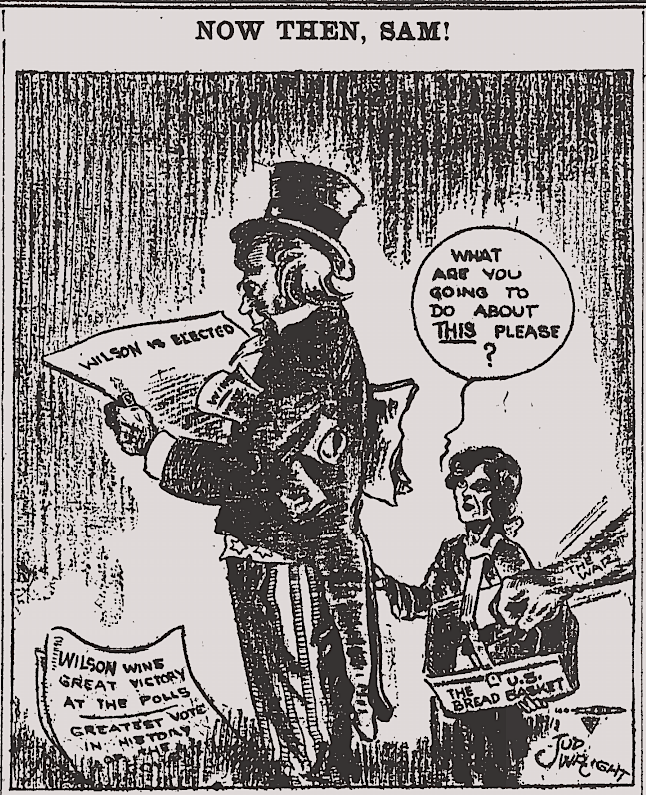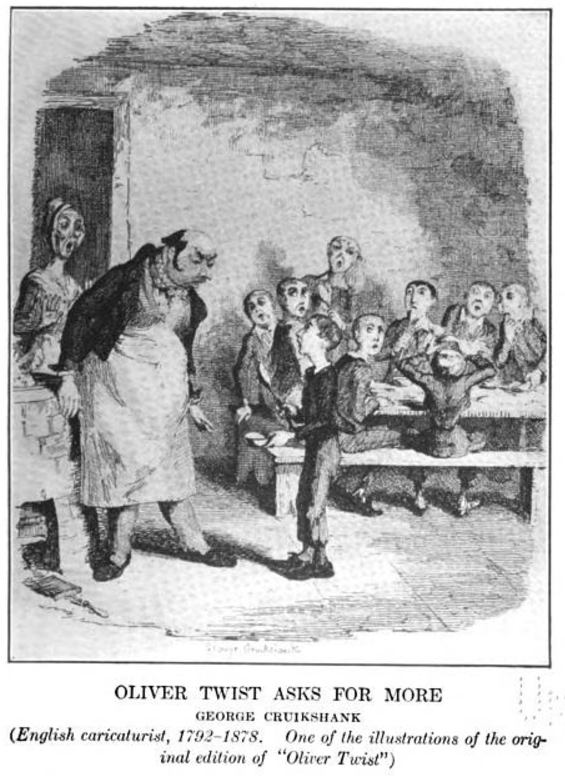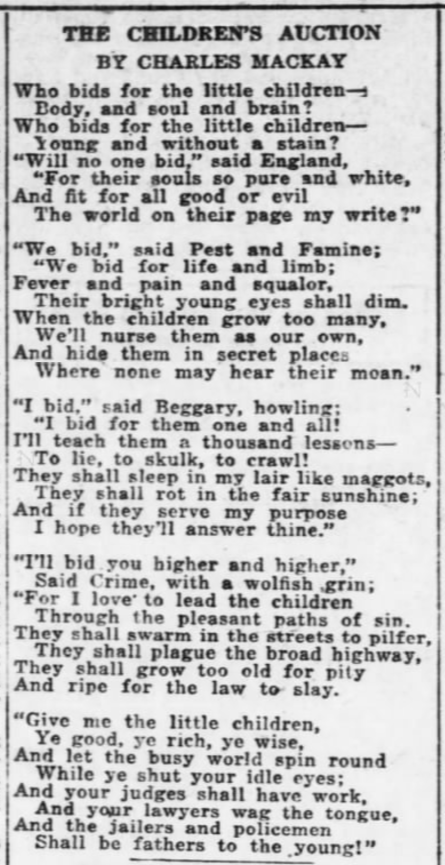You ought to be out raising hell.
This is the fighting age.
Put on your fighting clothes.
-Mother Jones
Hellraisers Journal, Friday November 24, 1916
Washington, D. C. – Investigation of Hunger to Commence
From the American Socialist of November 18, 1916:
INVESTIGATING HUNGER.
Attorney General Gregory announces that he will investigate the “abnormal and suspicious increases in the prices of the various necessities of life, especially coal.”
If it is found that such increases are due “to conspiracy and other unlawful action,” the department will invoke the severest penalties which the law prescribes.
When hunger stalks abroad in the land, when America is starved to pile up profits for private gamblers who feed the war in Europe, the attorney general promises an investigation that will change nothing whatever in the general situation and will not put one single piece of bread into one hungry mouth. There is no law passed by any old party that prevents any business man from charging for his goods what “the traffic will bear.”
Even if there were such a law, fining or jailing a few business men will not alter one whit the practices of the whole business class.
The attorney general may or may not prove a “conspiracy” after a long and useless suit against this or that set of profiteers, but he and all members of the old party governments are parts of that general conspiracy which permits a few to despoil the many. He will not discover that kind of a conspiracy, however, no matter how long he may investigate.
The report of the Industrial Relations Committee, which President Wilson and his party majority tried to suppress, gives all the facts necessary to prove that private control of public necessities condemns the majority of the American people to a life of lasting insecurity and want.
No further investigation is needed. Let the administration act upon the facts already known and undisputed. Let congress pass a law to control the prices of all necessities and to insure this control by a national system of government ownership and management.
Hunger and want can not be stopped by investigations, reports or law suits. The way to stop price boosting and gambling in life’s necessities is to feed, house and clothe every man, woman and child in the United States. The country is rich enough to do so. The only thing that stands in the way is old party respect for private profit and old party contempt for human life, liberty and happiness.
-Cartoon and Editorial from the Milwaukee Leader.
———-
From the Appeal to Reason of November 18, 1916:
“I Want Some More”
(Charles Dickens, in “Oliver Twist,” did a great deal to reform children’s poor asylums. His picture of the wretched conditions in the homes of poverty-stricken children touched the hearts of the people. In the following, we quote the part of the novel which has already become a classic-that in which hungry little Oliver Twist has the temerity to say “I want some more.” He was so hungry that the gruel was not enough to keep Oliver Twist, nor his young comrades, even half nourished. In these days of high prices, there are undoubtedly millions of free Americans who, after finishing supper, feel like approaching the beef trust and saying: “Please, sir, I want some more.” But alas, the average wage slave lacks the spirit of Oliver Twist. Read it yourself:)
—–
The room in which the boys were fed, was a large stone hall, with a copper at one end; out of which the master, dressed in an apron for the purpose, and assisted by one or two women, ladled the gruel at mealtimes. Of this festive composition each boy had one porringer, and no more-except on occasions of great public rejoicing, when he had two ounces and a quarter of bread besides. The bowls never wanted washing. The boys polished them with their spoons till they shone again; and when they had performed this operation (which never took very long, the spoons being nearly as large as the bowls) they would sit staring at the copper, with such eager eyes, as if they could have devoured the very bricks of which it was composed; employing themselves, meanwhile, in sucking their fingers most assiduously, with the view of catching up any stray splashes of gruel that might have been cast thereon. Boys have generally excellent appetites. Oliver Twist and his companions suffered the tortures of slow starvation for three months; at last they got so voracious and wild with hunger, that one boy, who was tall for his age, and hadn’t been used to that sort of thing (for his father had kept a small cook-shop) hinted darkly to his companions, that unless he had another basin of gruel per diem, he was afraid he might some night happen to eat the boy who slept next him, who happened to be a weakly youth of tender age. He had a wild, hungry eye; and they implicitly believed him. A council was held; lots were cast who should walk up to the master after supper that evening, and ask for more; and it fell to Oliver Twist.
The evening arrived; the boys took their places. The master, in his cook’s uniform, stationed himself at the copper; his pauper assistants ranged themselves behind him; the gruel was served out; and a long grace was said over the short commons. The gruel disappeared; the boys whispered each other, and winked at Oliver; while his next neighbors nudged him. Child as he was, he was desperate with hunger, and reckless with misery. He rose from the table, and advancing to the master, basin and spoon in hand, said somewhat alarmed at his own temerity:
“Please, sir, I want some more.”
The master was a fat, healthy man; but he turned very pale. He gazed in stupified astonishment on the small rebel for some seconds, and then clung for support to the copper. The assistants were paralized with wonder; the boys with fear.
“What!” said the master at length, in a faint voice.
“Please, sir,” replied Oliver, “I want some more.”
The master aimed a blow at Oliver’s head with the ladle; pinioned him in his arm; and shrieked aloud for the beadle.
The board were sitting in solemn conclave, when Mr. Bumble rushed into the room in great excitement, and addressing the gentleman in the high chair, said:
“Mr. Limbkins, I beg your pardon, sir! Oliver Twist has asked for more!”
There was a general start. Horror was depicted on every countenance.
“For more!” said Mr. Limbkins. “Compose yourself, Bumble, and answer me distinctly. Do I understand that he asked for more, after he had eaten the supper allotted by the dietary?”
“He did, sir,” replied Bumble.
“That boy will be hung,” said the gentleman in the white waistcoat. “I know that boy will be hung.”
Nobody controverted the prophetic gentleman’s opinion. An animated discussion took place. Oliver was ordered into instant confinement; and a bill was next morning pasted on the outside of the gate, offering a reward of five pounds to anybody who would take Oliver Twist off the hands of the parish. In other words, five pounds and Oliver Twist were offered to any man or woman who wanted an apprentice to any trade, business, or calling.
“I never was more convinced of anything in my life,” said the gentleman in the white waistcoat, as he knocked at the gate and read the bill next morning: “I never was more convinced of anything in my life, than I am that that boy will come to be hung.”
———-
[Photograph added.]
“The Children’s Auction” by Charles Mackay:
SOURCES
American Socialist
(Chicago, Illinois)
-Nov 18, 1916
https://www.marxists.org/history/usa/pubs/american-socialist/v3n19-nov-18-1916-TAS.pdf
Appeal to Reason
(Girard, Kansas)
-Nov 18, 1916
https://www.newspapers.com/image/67312422/
IMAGES
Uncle Sam and Hunger, Am Socialist, Nov 18, 1916
https://www.marxists.org/history/usa/pubs/american-socialist/v3n19-nov-18-1916-TAS.pdf
Oliver Twist Asks for More from Cry for Justice, 1915
https://books.google.com/books/reader?id=C2dM39ndd2AC&printsec=frontcover&output=reader&source=gbs_atb&pg=GBS.PA656-IA1
Children’s Auction by Charles Mackay, AtR, Nov 18, 1916
https://www.newspapers.com/image/67312422/
See also:
“Yours for the Revolution”: the Appeal to Reason, 1895-1922
-ed by John Graham
University of Nebraska Press, Jun 1, 1990
(See page 243-“Few British writers were as much admired at the Appeal as Charles Dickens.”)
https://books.google.com/books?id=2_YDAQAAIAAJ
The Adventures of Oliver Twist
-by Charles Dickens
Chapman and Hall, 1858
https://books.google.com/books?id=cxHZ0rIU1L8C
“Please, Sir, I want some more.”
https://books.google.com/books/reader?id=cxHZ0rIU1L8C&printsec=frontcover&output=reader&source=gbs_atb&pg=GBS.PA12
The Cry for Justice
-ed by Upton Sinclair
The John C. Winston Company, 1915
https://books.google.com/books?id=C2dM39ndd2AC
Oliver Twist Asks for More
https://books.google.com/books/reader?id=C2dM39ndd2AC&printsec=frontcover&output=reader&source=gbs_atb&pg=GBS.PA655
The Children’s Auction by Charles Mackay
https://books.google.com/books/reader?id=C2dM39ndd2AC&printsec=frontcover&output=reader&source=gbs_atb&pg=GBS.PA657



